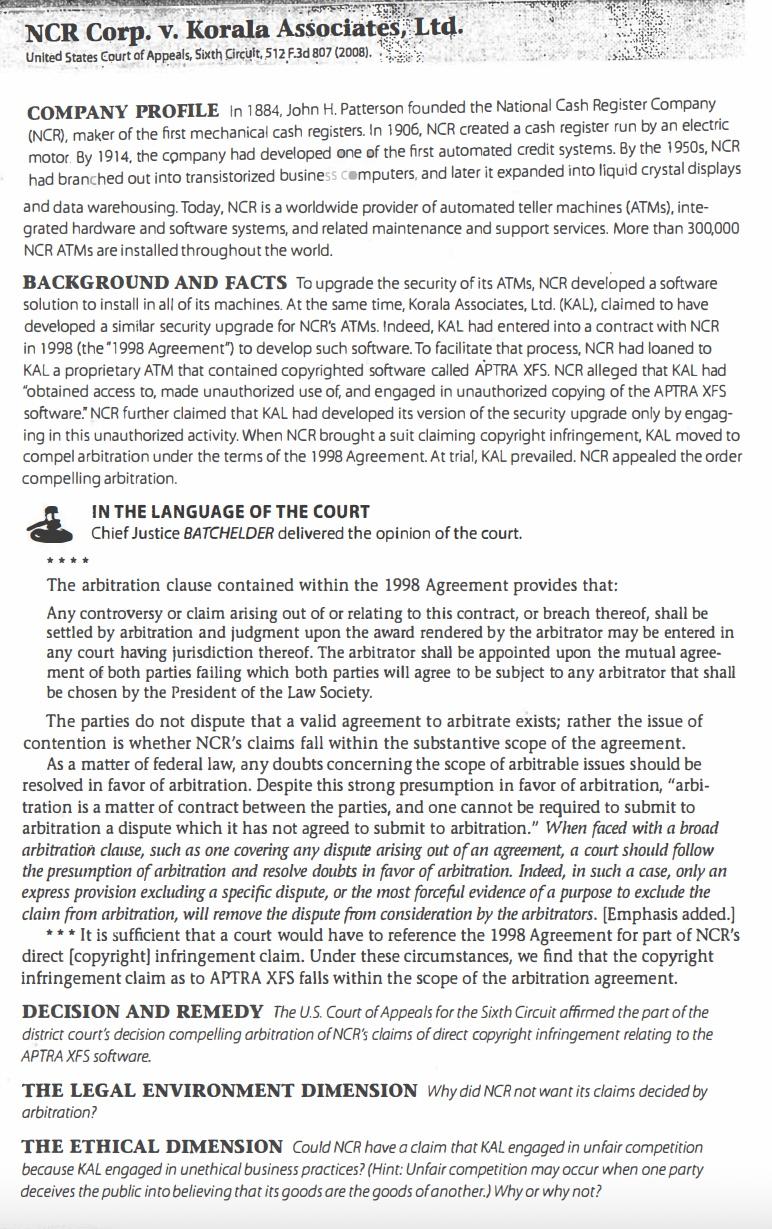Answered step by step
Verified Expert Solution
Question
1 Approved Answer
Please follow the outline: Issue Rule of Law Analysis Conclusion NCR Corp. v. Korala Associates, Ltd. United States Court of Appeals, Sixth Circuit, 512 F.3d

Please follow the outline:
Issue
Rule of Law
Analysis
Conclusion
NCR Corp. v. Korala Associates, Ltd. United States Court of Appeals, Sixth Circuit, 512 F.3d 807 (2008). COMPANY PROFILE In 1884, John H. Patterson founded the National Cash Register Company (NCR), maker of the first mechanical cash registers. In 1906, NCR created a cash register run by an electric motor. By 1914, the company had developed one of the first automated credit systems. By the 1950s, NCR had branched out into transistorized business computers, and later it expanded into liquid crystal displays and data warehousing. Today, NCR is a worldwide provider of automated teller machines (ATMs), integrated hardware and software systems, and related maintenance and support services. More than 300,000 NCR ATMs are installed throughout the world. BACKGROUND AND FACTS To upgrade the security of its ATMs, NCR developed a software solution to install in all of its machines. At the same time, Korala Associates, Ltd. (KAL), claimed to have developed a similar security upgrade for NCR's ATMs. Indeed, KAL had entered into a contract with NCR in 1998 (the "1998 Agreement") to develop such software. To facilitate that process, NCR had loaned to KAL a proprietary ATM that contained copyrighted software called APTRA XFS. NCR alleged that KAL had "obtained access to, made unauthorized use of, and engaged in unauthorized copying of the APTRA XFS software." NCR further claimed that KAL had developed its version of the security upgrade only by engaging in this unauthorized activity. When NCR brought a suit claiming copyright infringement, KAL moved to compel arbitration under the terms of the 1998 Agreement. At trial, KAL prevailed. NCR appealed the order compelling arbitration. IN THE LANGUAGE OF THE COURT Chief Justice BATCHELDER delivered the opinion of the court. The arbitration clause contained within the 1998 Agreement provides that: Any controversy or claim arising out of or relating to this contract, or breach thereof, shall be settled by arbitration and judgment upon the award rendered by the arbitrator may be entered in any court having jurisdiction thereof. The arbitrator shall be appointed upon the mutual agreement of both parties failing which both parties will agree to be subject to any arbitrator that shall be chosen by the President of the Law Society. The parties do not dispute that a valid agreement to arbitrate exists; rather the issue of contention is whether NCR's claims fall within the substantive scope of the agreement. As a matter of federal law, any doubts concerning the scope of arbitrable issues should be resolved in favor of arbitration. Despite this strong presumption in favor of arbitration, "arbitration is a matter of contract between the parties, and one cannot be required to submit to arbitration a dispute which it has not agreed to submit to arbitration." When faced with a broad arbitration clause, such as one covering any dispute arising out of an agreement, a court should follow the presumption of arbitration and resolve doubts in favor of arbitration. Indeed, in such a case, only an express provision excluding a specific dispute, or the most forceful evidence of a purpose to exclude the claim from arbitration, will remove the dispute from consideration by the arbitrators. [Emphasis added.] It is sufficient that a court would have to reference the 1998 Agreement for part of NCR's direct [copyright] infringement claim. Under these circumstances, we find that the copyright infringement claim as to APTRA XFS falls within the scope of the arbitration agreement. DECISION AND REMEDY The U.S. Court of Appeals for the Sixth Circuit affirmed the part of the district court's decision compelling arbitration of NCR's claims of direct copyright infringement relating to the APTRAXFS software. THE LEGAL ENVIRONMENT DIMENSION Why did NCR not want its claims decided by arbitration? THE ETHICAL DIMENSION Could NCR have a claim that KAL engaged in unfair competition because KAL engaged in unethical business practices? (Hint: Unfair competition may occur when one party deceives the public into believing that its goods are the goods of another.) Why or why notStep by Step Solution
There are 3 Steps involved in it
Step: 1

Get Instant Access to Expert-Tailored Solutions
See step-by-step solutions with expert insights and AI powered tools for academic success
Step: 2

Step: 3

Ace Your Homework with AI
Get the answers you need in no time with our AI-driven, step-by-step assistance
Get Started


